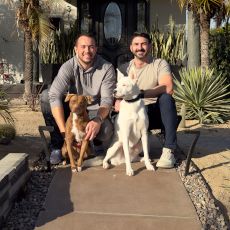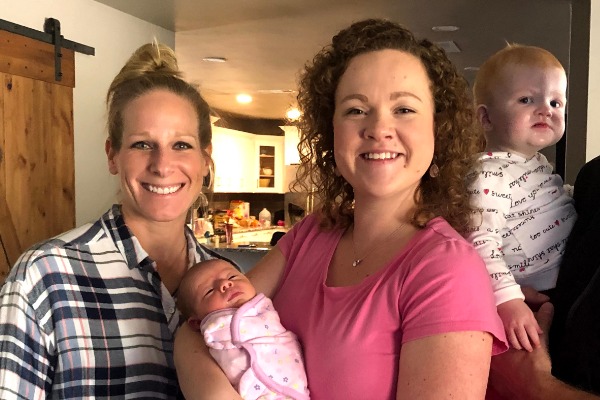Making an Adoption Plan in Prison [Can You Still Choose Adoption?]

Discovering you’re pregnant in prison can be overwhelming because now you have three choices:
- Have your baby in jail and try to parent your child when you’re released.
- Request an abortion from the prison’s medical provider.
- Place your baby for adoption with a loving family of your choosing.
If you think adoption is the right choice for you, call 1-800-ADOPTION now to get information.
You might be surprised to find that the adoption process for women having babies in prison is actually essentially the same as it is for any other woman.
Your prison adoption process will typically follow these four steps:
-
Choosing adoption
-
Contacting an adoption professional
-
Choosing the adoptive family
-
Legally consenting to the adoption
American Adoptions can help you complete these four steps. This guide will explore these steps more in-depth and give you an overview of how you can create an adoption plan in prison.
To get more information or support with your situation, visit here or call 1-800-ADOPTION.
How the Prison Adoption Process Works
Step 1: Choose Adoption
Adoption can create a better future for yourself and your baby, but it is a personal choice that you have to make. Being pregnant in prison will likely be a major factor in your decision, of course, but it may not completely limit your options, either.
Talk to your prison caseworker about the options that are available to you, and what happens when you have a baby in jail. They can also probably refer you to an emotional counselor who can help you work through the thoughts and emotions you’re experiencing at this point. Only you can know what’s best for you and your child.
If you do decide that a prison infant adoption is what’s right for you and your baby, you’re ready to move on to step two.
Step 2: Contact an Adoption Professional
American Adoptions can help you find the support you need when you are pregnant in prison, including finding a loving family for your baby.
Depending on the regulations of where you’re incarcerated, you may or may not be able to work directly with your adoption specialist. Your caseworker may act as a go-between and walk you through the prison adoption program themselves.
Your caseworker will likely automatically refer you to a particular adoption agency or lawyer because prisons usually work with the same professional any time a woman is giving birth in prison. However, you always have the right to choose your preferred adoption professional so that you can make an adoption plan that you are comfortable with.
Helpful Information
Step 3: Choose the Adoptive Family
Pregnant inmates have the right to choose the parents for their baby that they feel are best.
Unlike most prospective birth mothers, you probably won’t be able to meet the family before the adoption or talk to them directly due to prison visitor restrictions. However, your adoption professional and your caseworker will make sure that you’re able to find a waiting adoptive family who matches what you’re looking for in an ideal family for your baby.
Whether you’re looking for a family that you can share an open adoption with after you’re released, a family that lives in a certain area of the U.S., or who has a particular faith or family makeup, we can show you profiles of families that best match what you’re looking for.
Depending on the rules of your prison, you may be able to exchange letters and phone calls with the adoptive family while you’re still in prison. We’ll help facilitate contact between you and the adoptive family however we can, both while you’re incarcerated and after you’ve been released.
Step 4: Sign Your Adoption Consent
When you give birth in prison, you’ll usually be moved to a nearby hospital when you go into labor.
Options for incarcerated women can be more limited than other prospective birth mothers depending on the restrictions of your prison and the hospital, but you’ll usually be able to decide how much time you spend with your baby, and you may be able to meet the adoptive family and more.
At the hospital, you’ll wait a state-mandated waiting period before signing your adoption consent forms. While most women can take their time in signing these papers, you may have a more limited time to sign your consent forms or the adoption process could be in jeopardy and your baby may be involuntarily placed into foster care.
When the adoption consent forms have been signed and you’ve been discharged from the hospital, you’ll work on a post-adoption contact plan with your caseworker in prison. You’ll also be able to receive counseling as you process the complicated emotions that women often deal with after placing a baby for adoption.
Adoption is Always a Legal Option for You
Some women worry that they’ll face legal consequences if they place their baby for adoption. Or, women who are pregnant in jail worry that their sentence will be extended if they choose adoption.
It’s important to know that it’s always legal and safe for you to place your baby for adoption when it’s completed through a licensed agency like American Adoptions.
By making an adoption plan with our agency, you can avoid potential legal consequences like child abandonment, endangerment or neglect, which are serious charges that women have faced when they’ve found out they were unable to care for their child.
You can always legally choose adoption, no matter what stage you’re at in your pregnancy (or even if your child is already born) and whether or not you’re pregnant and in jail.
It’s important to understand that adoption is always an option for pregnant women in prison. The women who enter jail and are pregnant often worry, “What happens to babies born in jail?” One option: they can grow up happy and loved with their adoptive family.
Contact us now online or at 1-800-ADOPTION to get free information if you’re pregnant in jail and would like to learn more about placing your baby adoption from prison, or to begin viewing waiting family profiles.
Disclaimer
Information available through these links is the sole property of the companies and organizations listed therein. American Adoptions provides this information as a courtesy and is in no way responsible for its content or accuracy.








































